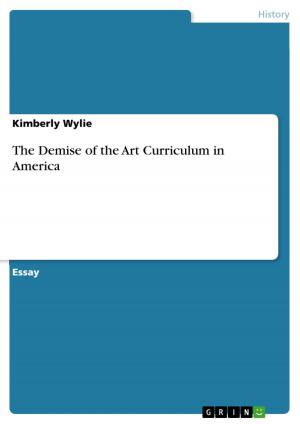Love and dramatic genre - Approaches to the topic of love in three Shakespearean plays
Approaches to the topic of love in three Shakespearean plays
Fiction & Literature, Literary Theory & Criticism, British| Author: | Thomas Eger | ISBN: | 9783638510271 |
| Publisher: | GRIN Publishing | Publication: | June 15, 2006 |
| Imprint: | GRIN Publishing | Language: | English |
| Author: | Thomas Eger |
| ISBN: | 9783638510271 |
| Publisher: | GRIN Publishing |
| Publication: | June 15, 2006 |
| Imprint: | GRIN Publishing |
| Language: | English |
Examination Thesis from the year 2003 in the subject English Language and Literature Studies - Literature, grade: 1,3, Bielefeld University, 71 entries in the bibliography, language: English, abstract: 'Love' is a central topic in Shakespeare's plays. Many of his couples have gained a status of immortality: Antony and Cleopatra, Romeo and Juliet, or Beatrice and Benedick are only a few examples. These lovers share one experience, which Lysander in 'A Midsummer Night's Dream' sums up very clearly: 'The course of true love never did run smooth ...' (1,1,134) This dilemma is the 'raw material' I am interested in. I will take three Shakespearean plays with 'love' as their central issue and examine the protagonists' courses of love in them. This involves the beginning, the obstacles in the way, the reactions to these obstacles and the final failure or success to overcome them. The plays chosen are 'Romeo and Juliet', 'All's Well that Ends Well', and 'The Taming of the Shrew'. In the First Folio edition the first one is classified as belonging to the literary form of 'tragedy', the latter two as 'comedies'. This leads me to the second element in the title, which is 'dramatic genre'. What Northrop Frye says about comedy is also valid for tragedy: 'If a play in a theatre is subtitled 'a comedy', information is conveyed to a potential audience about what kind of thing to expect, and this type of information has been intelligible since before the days of Aristophanes.' One such expectation concerns a play's mood. Here lies a fundamental difference between tragedy and comedy. Generally speaking, the audience expects that a comedy creates a happy mood and a tragedy a sad one. However, I am not alone finding that 'Romeo' is a rather happy play over long stretches, whereas 'The Taming' and 'All's Well' are anything but thoroughly happy pieces. In these three dramas Shakespeare only partly fulfils the expectations, which are evoked. Their generic structure does not generate a consistent mood. So what are the causes of this inconsistency?
Examination Thesis from the year 2003 in the subject English Language and Literature Studies - Literature, grade: 1,3, Bielefeld University, 71 entries in the bibliography, language: English, abstract: 'Love' is a central topic in Shakespeare's plays. Many of his couples have gained a status of immortality: Antony and Cleopatra, Romeo and Juliet, or Beatrice and Benedick are only a few examples. These lovers share one experience, which Lysander in 'A Midsummer Night's Dream' sums up very clearly: 'The course of true love never did run smooth ...' (1,1,134) This dilemma is the 'raw material' I am interested in. I will take three Shakespearean plays with 'love' as their central issue and examine the protagonists' courses of love in them. This involves the beginning, the obstacles in the way, the reactions to these obstacles and the final failure or success to overcome them. The plays chosen are 'Romeo and Juliet', 'All's Well that Ends Well', and 'The Taming of the Shrew'. In the First Folio edition the first one is classified as belonging to the literary form of 'tragedy', the latter two as 'comedies'. This leads me to the second element in the title, which is 'dramatic genre'. What Northrop Frye says about comedy is also valid for tragedy: 'If a play in a theatre is subtitled 'a comedy', information is conveyed to a potential audience about what kind of thing to expect, and this type of information has been intelligible since before the days of Aristophanes.' One such expectation concerns a play's mood. Here lies a fundamental difference between tragedy and comedy. Generally speaking, the audience expects that a comedy creates a happy mood and a tragedy a sad one. However, I am not alone finding that 'Romeo' is a rather happy play over long stretches, whereas 'The Taming' and 'All's Well' are anything but thoroughly happy pieces. In these three dramas Shakespeare only partly fulfils the expectations, which are evoked. Their generic structure does not generate a consistent mood. So what are the causes of this inconsistency?















